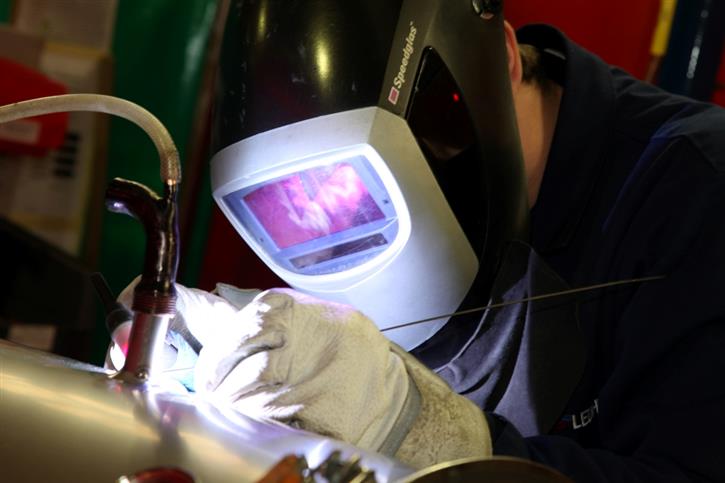

Jason Hobson discusses the advantages of combining wood-fuelled energy sources with thermal stores
It would seem that the wood burner has become to the living rooms of the UK's aspirational homes what the Aga is to the kitchen and the power shower is to the bathroom.
While some homeowners still hesitate over solar installations because of their impact on the external aesthetics of a house, there's consumer enthusiasm for both the aesthetics and cosy lifestyle appeal of wood burners, even before any energy efficiency, sustainability or feed in tariff perks are mooted.
But what's the best way to ensure that an installation maximises the energy inputs of wood-fuelled heat sources safely and efficiently in a configuration that will also support comfort and ease of use for the homeowner? For most applications, a thermal store provides the safest and most efficient solution and, if specified correctly, it can also prove simple to install and easy to connect to multiple renewable energy sources within the property.
Comfort and functionality
In addition to using the hot water within the store to circulate around the heating system, a thermal store also uses the stored water to heat mains cold water instantaneously via a plate heat exchanger, delivering mains pressure hot water at the taps. They are an increasingly popular solution across both traditional and renewable energy sources thanks to their ability to store any excess heat generated.
Suitable for use with either a single renewable technology or with several technologies in combination, the system can be boosted by a traditional gas or oil boiler or immersion heater to maintain a consistent domestic hot water supply even when heating is not required during the summer months.
From a home comfort perspective, the thermal store's ability to capture the heat input for use when needed is a vital advantage in wood-fuelled systems. It means that the system can be used at maximum efficiency to generate the domestic hot water instantaneously and users don’t have to wait for the wood burning stove to reach temperature to draw hot water from taps.
The incorporated flow sensor technology plays a central role in reducing hot water response times, while a high efficiency ERP-ready pump ensures efficient circulation of the water through the plate heat exchanger to maximise thermal transfer. The result is excellent flow rates and consistent mains pressure hot water on demand.
Sizing of the thermal store to complement both the size of the property and the type of wood fuel being used is also an important factor in optimising performance. Gledhill's Torrent ECO thermal store range, for example, can hold between 140 and 450 litres of water and sizing considerations that would affect any hot water cylinder also apply here in terms of the number of bathrooms and predicted occupancy levels. However, a pellet boiler can cope with changes in heat demand more quickly than a log burner so will require a smaller thermal store.
Safety and simplicity
An open-vented thermal store is inherently safe for uncontrolled heat sources such as wood-fuelled heating systems, because it protects against unsafe pressure build up within the unit due to spikes in heat input, removing any risk of an explosion within the unit.
The thermal store also avoids any risk of legionella because cold water from the mains is heated instantaneously via the heat exchanger to provide the hot water supply and the water in the store and mains supply never mix.
Open vented thermal stores also offer ease of installation benefits for both heating and plumbing professionals and homeowners. The thermal store is only filled with water once, so there is no requirement for a permanent connection to a cold feed tank, which means that there is no need for an overflow or discharge pipe either and no G3 certification on installation.
Post installation, there is no annual servicing requirement, which reduces both cost and inconvenience for the end user.
Specifying the correct model of thermal store for the energy source(s) is vital, particularly if there is more than one renewable energy source being installed at the property or if additional renewable technologies are likely to be installed in the future. However, a cylinder manufacturer like Gledhill can custom-fabricate a thermal store with bespoke connections to meet specific installation requirements, as well as offering a full range of standard stores for varied energy inputs.
Efficient Solution
While feed-in tariffs for biomass may have been reduced, the popularity of wood-fuelled systems seems unlikely to diminish.
Moving forward, however, it will be more important than ever to maximise the system's efficiency and ensure that the higher energy inputs of biomass installations are used effectively to reduce energy bills within the home. The ability of thermal stores to harness energy from wood-fuelled sources, often in combination with other renewables and off-peak electric immersion, makes them the ideal choice for maximising the benefits of wood burners safely and with minimal maintenance.
Jason Hobson is managing director of Gledhill
If you'd like to keep up-to-date with the latest developments in the heating and plumbing industry, why not subscribe to our weekly newsletters? Just click the button below and you can ensure all the latest industry news and new product information lands in your inbox every week.